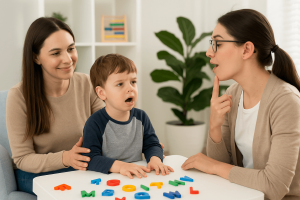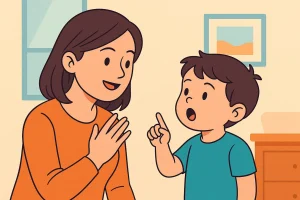Speech and Language Therapy Difficulties faced by Autistic Children
By Rajini D
Last Updated: November 27, 2021
Autism Spectrum Disorder or ASD can be defined as a complex neurobehavioral condition that includes impairments in social interaction and developmental language and communication skills combined with rigid, repetitive behaviors. The word “spectrum” indicates the wide variation in the range and severity on how people are affected with Autism, and the difficulties they face. As the symptoms range in a wide-variety, this condition is called Autism Spectrum Disorder.
Autism is a neurological disorder that involves impaired communication, social interaction and cognitive skills. Autism Spectrum Disorder or ASD involves a wide range of other behaviors such as repetitive actions, unusual responses to senses such as touch, inability to interact with environment around and showing extreme resistance to changes in daily routines. People with Autism have difficulties not only with speech but also with non verbal communications, which makes them tough to have social interactions. Hence, speech therapy has been the central focus of all the Autism therapies.
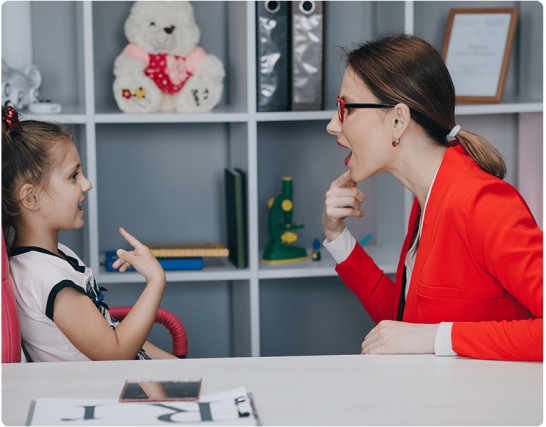
Communication Difficulties
Communication includes semantics and pragmatics of language, where semantics means understanding the meaning of words and pragmatics refer to the social use of the language. The individuals with Autism face problem with these communication difficulties like understanding the meaning of words spoken by others and the usage of those words, appropriately. The Speech Language Therapist aka SLT will work with the individual and the immediate family members in promoting further language and skill development.
Symptoms
The main symptoms that indicate the necessity of speech therapy, for an Autistic child, include the following.
- Not talking at all
- Unable to express basic wants
- Making unusual sounds like sudden grunts, shrieks, or cries
- Talking, murmuring or just humming in a musical way
- Using alien-speech like words or sounds
- Not responding in a conversation or for a question
- Repeating words or phrases said by anyone around
- Babbling with word-like sounds
- Difficulty in following instructions
- Using words or phrases with a perfect-timing, but without an expressional tone
Though they try to communicate, their language will be too hard to understand. Behaviors like the above are more commonly observed in Autistic children and they need speech therapy for better communication skills.
Echolalia
They mostly try to repeat the words said by someone around or the speaker him/herself. Such a meaningless repetition of someone’s spoken words, as a part of a psychological disorder is called as Echolalia.
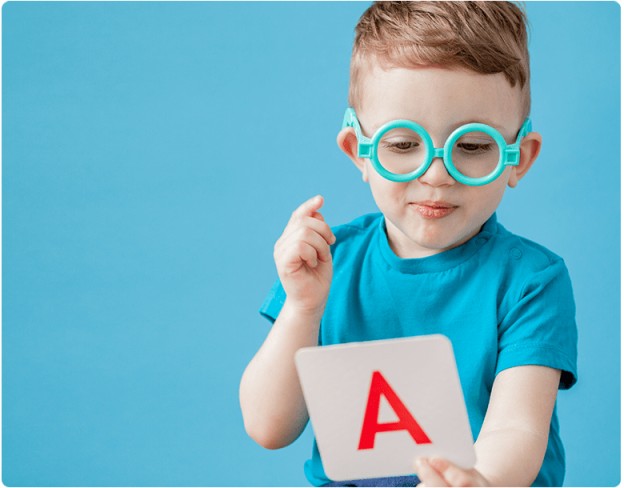
Non-Verbal difficulties
Children with Autism face communication challenges that keep them away from social interaction. The non-verbal difficulties they face include the following.
- Having poor conversational skills like maintaining eye-contact or proper body language
- Meaning of some words that are out of context, are not understandable
- Unable to understand the meaning of what is said but can memorize the words
- Using Echolalia is to communicate when unable to answer
- Unable to understand the meaning of signs, symbols and some words
- Ignoring or avoiding others
- Preferring to play alone
- Not being responsive to someone
- Dislike being touched
- Difficulty in expressing emotions
- Lack of creative language
So, an Autism child has lot to do while coping with these difficulties, such as trying to understand what others say, learning how to use language, interpreting both verbal and non-verbal cues from others like facial expressions, tone of voice and body language.
Common Challenges vs. Speech Therapy Techniques
| Challenge | Technique | Expected Outcome |
|---|---|---|
| Echolalia | Echoing and Expansions | Improved functional communication, better understanding and use of language for communication rather than mere repetition. |
| Non-verbal Communication | Use of AAC Devices | Introduction of alternative communication methods, enhancing the ability to express needs and emotions. |
| Difficulty Understanding Verbal Instructions | Visual Supports (e.g., Picture Boards) | Enhanced comprehension of instructions and requests, leading to better day-to-day interactions. |
| Limited Vocabulary | Vocabulary Expansion Techniques | Increased word knowledge and usage, allowing for more expressive communication. |
| Poor Social Interaction Skills | Social Stories and Role-Playing | Improved understanding of social cues and norms, enhanced participation in social situations. |
| Difficulty with Speech Production | Articulation Exercises | Clearer speech production, making communication with others easier and more effective. |
| Difficulty with Conversation Skills | Turn-Taking and Topic Maintenance Practices | Enhanced conversational abilities, including staying on topic and appropriately taking turns during dialogues. |
| Lack of Initiative in Communication | Prompting and Naturalistic Teaching | Increased initiation of communication, leading to more independent social interactions. |
Use of Speech Therapy
Speech therapy can address a wide range of communication problems for people with Autism. Speech therapists are the specialists who are trained in treating speech disorders and language problems. With early screening, therapists can help with the diagnosis of Autism and can refer to other specialists relating to their treatment. Speech therapists design the treatment plan according to their requirements and also work closely with their parents, other family members, friends and relatives who are associated with the person getting treated. Educating parents and training other important people in child’s life are pivotal in successful therapy.
If the person is completely unable to speak, the speech therapists can suggest alternative ways to help them communicate.

The following are some of the few techniques that will help the child to improve language comprehension and expression.
The Techniques
- Matching: helps in understanding e.g. Object to object matching, picture to picture and picture to object matching etc.
- Sorting: Classifying the items to respective categories helps child to improve comprehension
- Imitation: Encourage the child to repeat the word after you.
- Echoing: Repeat the child’s utterance back to him (electronic talkers can be used)
- Binary choice: Provide with two or more choices and make the child choose and express the intended word.
- Sentence expansion and completion: Elaborate the child’s utterance by providing more information
- Demonstrating actions: Physically act out the information said.
- Use the visual mode: This will be seen that children with autism understand better with the visual mode than any other modes. So, use the visual mode along with other modes. Using picture boards with words helps them understand the meaning of the word.
- Repetition: Be ready to repeat the instructions again and again to the child. We must understand that the child finds difficult and may not understand what you say the first time. Pronouncing the words intended repeatedly with expressions will help them in understanding.
Also read : What is the Relation between Communication, Speech and Language? | Speech and Language Therapy
Such techniques help an Autistic child to improve the speech and language skills. These can be done at home with the support of a speech therapists and the child’s pediatrician.
Benefits of Early Intervention in Speech Therapy
| Age Range | Intervention Benefits |
|---|---|
| Under 3 years | – Maximizes neuroplasticity, taking advantage of the brain’s developing architecture for easier learning and adaptation. – Early language foundation, setting the stage for more complex language skills. – Enhances social interaction skills from a young age, promoting better integration into social settings. |
| 3-5 years | – Improves language acquisition, building on early foundations to enhance vocabulary and sentence structure. – Prepares for academic success by developing pre-literacy skills. – Strengthens social communication, allowing for smoother transitions into school environments and peer interactions. |
| 5-7 years | – Solidifies speech production and clarity, addressing articulation issues before they can impact literacy. – Enhances conversational skills, supporting more complex interactions and storytelling. – Supports academic and social success by fine-tuning language comprehension and expression. |
| 7-10 years | – Focuses on refining language for academic success, including understanding complex instructions and producing detailed written work. – Develops advanced social communication strategies, such as understanding non-literal language and social nuances. – Aids in the self-regulation of emotions and behaviors through improved communication skills. |
Read more on Alternative Solutions for Nonverbal Children
Outcomes of a Speech Therapy
The goals of Speech therapy aim to help the individual with Autism to achieve the following
- Communicating both verbally and non-verbally
- Understanding other’s intentions well
- Articulating words to match the scenario
- Initiating a conversation
- Exchanging ideas
- Regulating oneself
- Developing conversational skills
- Enjoying communicating, interacting and playing with others
- Knowing the proper time to greet others or to initiate conversations
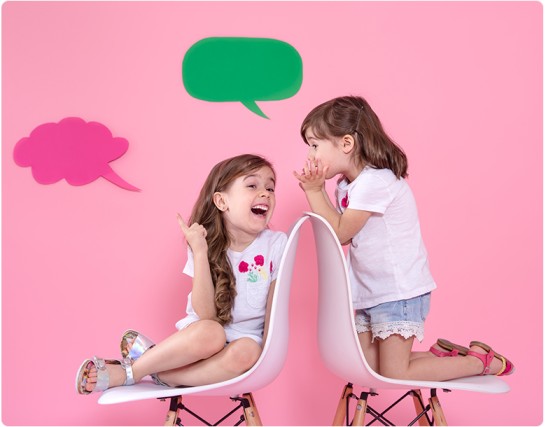
Learn more: Unlocking Communication: Effective Speech Therapy for Autism
Intensive and individual treatments can help lessen the effect of social communication disability.
Autism is a neurological disorder that can exhibit similar symptoms as mentioned. Having speech and language difficulties is one of them. Whenever you notice some difference in your child, consult a professional to diagnose the disorder. Commonly, kids without Autism are also likely to have speech problems.
Early intervention and correct diagnosis help your child recover as soon as possible. Whether the child has Autism or not, speech therapy can help them be on par with normal ones.
Conclusion
Speech and Language therapy challenges faced by autistic children, emphasizing the spectrum of difficulties inherent in Autism Spectrum Disorder (ASD). It details the communication struggles, including verbal and non-verbal hurdles, and the necessity for individualized speech therapy approaches. Techniques such as matching, imitation, and visual aids are highlighted as crucial in aiding autistic children to enhance their communicative skills, aiming for improved social interactions and understanding.
WellnessHub is presented as an essential platform that connects families with specialized speech therapists equipped to address the unique needs of children with ASD. By promoting early intervention and tailored therapy plans, WellnessHub significantly contributes to the developmental progress of these children, helping them to better navigate social communication. This focused approach not only aids in the personal growth of autistic children but also supports families in understanding and integrating effective communication strategies, fostering a more inclusive environment for all. In case, you observe any difference in your child, take a step forward and consult a professional speech therapist today to know the problem your child is facing. Book an appointment to meet a specialist, today.
Frequently Asked Questions:
1. What are common speech therapy challenges for children with Autism Spectrum Disorder (ASD)?
Children with ASD often face a range of speech therapy challenges, including difficulties with both verbal and non-verbal communication. Common issues include making unusual sounds, using repetitive language (echolalia), struggling with social cues like eye contact, understanding and using words appropriately, and engaging in conversations. Each child’s challenges are unique, requiring personalized speech therapy interventions.
2. How can speech therapy benefit children with autism?
Speech therapy offers numerous benefits for children with autism by improving their ability to communicate effectively. Techniques used in speech therapy, such as matching, imitation, and the use of visual aids, help enhance language comprehension and expression. This leads to better social interactions, the ability to articulate words more clearly, and an overall improvement in their quality of life and social integration.
3. What strategies do speech therapists use to help autistic children?
Speech therapists employ various strategies tailored to each child’s needs, including object and picture matching, sorting, imitation, echoing, binary choice, sentence expansion, demonstrating actions, and using visual modes of communication. These techniques aim to improve understanding, expression, and the ability to engage in meaningful social interactions.
4. What is the role of WellnessHub in managing speech therapy for autistic children?
WellnessHub plays a crucial role in connecting families with professional speech therapists who specialize in autism. It serves as a resource for finding individualized treatment plans and early intervention services, facilitating the developmental progress of children with ASD. WellnessHub supports families through the therapy process, helping to ensure that children receive the specialized care they need for better communication and social skills.
5. When should parents consider speech therapy for their child with autism?
Parents should consider speech therapy for their child with autism if they notice difficulties in verbal and non-verbal communication, such as not talking at all, making unusual sounds, using repetitive language, struggling with social cues, or showing resistance to changes in routine. Early intervention is key, so consulting a professional speech therapist as soon as these challenges are observed can lead to better outcomes.
6. How does speech therapy improve social interactions for autistic children?
Speech therapy improves social interactions for autistic children by enhancing their communication skills, allowing them to express their thoughts and needs more clearly, understand others better, and participate more fully in social settings. By developing these skills, children with autism can experience more meaningful interactions and build stronger relationships with those around them.
7. What is echolalia, and how is it addressed in speech therapy for autistic children?
Echolalia is the repetitive mimicking of words or phrases spoken by others, often without the intent to communicate meaningful information. It’s a common speech characteristic in children with autism. In speech therapy, echolalia is addressed by using structured teaching methods to expand on these repetitions, turning them into meaningful communication through modeling, prompting, and reinforcing spontaneous language use, aiming to improve functional communication skills.
8. Can speech therapy be customized for non-verbal autistic children?
Yes, speech therapy can be highly customized for non-verbal autistic children. Speech therapists may introduce alternative and augmentative communication (AAC) methods, such as sign language, picture exchange communication systems (PECS), or electronic communication devices. These methods enable non-verbal children to express their needs, preferences, and emotions, facilitating better engagement with their environment and improving their quality of life.
9. How does early intervention impact the effectiveness of speech therapy in autistic children?
Early intervention plays a critical role in the effectiveness of speech therapy for autistic children. Initiating speech therapy at a young age can capitalize on the brain’s natural plasticity, making it easier for children to develop and improve communication skills. Early intervention helps in addressing speech and language difficulties more effectively, leading to better long-term outcomes in language development, social interaction, and academic achievement.
10. What role do parents and caregivers play in the speech therapy process for autistic children?
Parents and caregivers are essential partners in the speech therapy process for autistic children. They provide consistent support and reinforcement of therapeutic techniques in the child’s daily environment, helping to generalize skills learned during therapy sessions. Speech therapists often train parents and caregivers on strategies to encourage communication, such as how to create opportunities for interaction, use visual supports, and model language use, thereby enhancing the child’s progress and engagement in social communications.
About the Author:
Rajini, Speech-Language Pathologist:
Rajini is a dedicated Speech-Language Pathologist with a focus on developmental speech and language disorders in children and rehabilitation in adults. With a passion for helping each individual find their voice, Rajini brings a wealth of experience and a heartfelt approach to therapy. At Wellness Hub, she’s part of a team that values innovation, compassion, and results-driven practices.
Book your Free Consultation Today
Parent/Caregiver Info:
Client’s Details:
* Error Message




